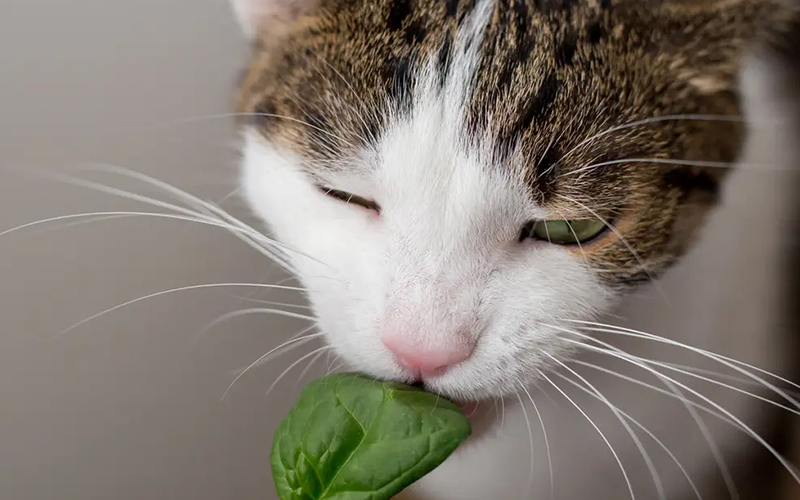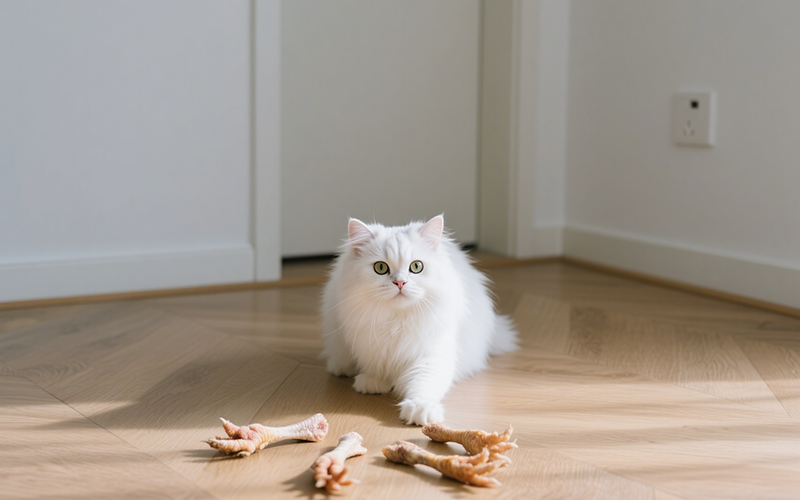Can Cats Eat Spinach? What You Need to Know Before Feeding Spinach to Your Cat
- 21 Feb 2025 15:43
Spinach is a leafy green vegetable that’s known for being rich in vitamins and nutrients for humans, but when it comes to our feline companions, the question arises: "Can cats eat spinach safely?" The short answer is: yes, cats can eat spinach in moderation, but there are important factors to consider before offering this leafy green to your cat.
Let’s take a closer look at the benefits and potential risks of feeding spinach to cats, as well as some tips for serving it safely.

The Benefits of Spinach for Cats
Rich in Nutrients
Spinach is loaded with essential vitamins and minerals, including vitamin A, vitamin K, folate, iron, and calcium. These nutrients support overall health, including the maintenance of healthy skin, bones, and a strong immune system.Antioxidants
Spinach contains antioxidants, such as flavonoids and carotenoids, which help combat free radicals in the body and support your cat's health. Antioxidants can help reduce inflammation and may contribute to a strong immune system.Fiber
Spinach is also a source of dietary fiber, which can be beneficial for cats in small amounts. Fiber supports healthy digestion and regular bowel movements. However, it's important to remember that cats are obligate carnivores and do not require much fiber in their diet.Low in Calories
Spinach is low in calories, which makes it a good choice for an occasional snack if you want to provide a healthy treat without worrying about extra calories. This can be especially helpful if your cat is overweight and you want to offer something nutritious without adding excess fat or sugar.
The Risks of Feeding Spinach to Cats
While spinach has several health benefits, there are also risks involved in feeding it to your cat:
Oxalates and Kidney Issues
Spinach contains oxalates, which are compounds that can interfere with calcium absorption and contribute to the formation of kidney stones in some cats. Cats with kidney disease or renal issues should not be fed spinach or any other foods that are high in oxalates. For healthy cats, small amounts of spinach are unlikely to cause significant problems, but it’s something to be cautious about.Digestive Upset
While fiber is good for digestion in small amounts, too much fiber can cause digestive upset in cats, leading to diarrhea, vomiting, or abdominal discomfort. If your cat has a sensitive stomach or is not accustomed to eating vegetables, introducing spinach gradually is essential to avoid digestive problems.Potential for Toxicity in Large Quantities
While spinach is not considered toxic to cats, feeding large amounts of spinach regularly can lead to nutrient imbalances. Excessive consumption of spinach may cause an upset stomach, and the high levels of oxalates may increase the risk of kidney problems over time.Risk of Contamination
Like all vegetables, spinach can be exposed to pesticides and harmful chemicals. It's essential to wash spinach thoroughly before offering it to your cat, or consider buying organic spinach to minimize the risk of contamination.
How to Safely Serve Spinach to Your Cat
If you decide to feed spinach to your cat, here’s how to do so safely:
Serve in Moderation
Spinach should only be given to your cat as an occasional treat. A small amount—about a teaspoon of chopped spinach—is enough for most cats. Too much spinach can lead to digestive upset or nutritional imbalances, so moderation is key.Cook the Spinach
Cooking spinach can help break down some of the oxalates and make it easier for your cat to digest. You can steam or lightly cook spinach without adding any salt, butter, or other seasonings that could be harmful to your cat. Avoid feeding raw spinach, as it may be harder for your cat to digest.Chop It Into Small Pieces
Spinach can be tough to chew, especially for small cats or kittens. To make it easier for your cat to eat and to prevent choking, chop the spinach into small, manageable pieces.Watch for Reactions
After feeding spinach to your cat for the first time, monitor them closely for any signs of vomiting, diarrhea, or abdominal discomfort. If any of these symptoms occur, discontinue feeding spinach and consult your veterinarian.Consult Your Vet If Your Cat Has Health Issues
If your cat has kidney disease or any other pre-existing health conditions, it’s important to consult your vet before introducing spinach or other leafy greens into their diet. Your vet can provide personalized advice based on your cat's individual health needs.
Should You Use PettureX for Your Cat’s Health?
If you’re ever unsure about what foods are safe for your cat or have concerns about their health, PettureX offers 24-hour online consultations with pet health professionals who can help answer your questions. PettureX provides expert advice on everything from diet to overall pet care, ensuring your cat stays healthy and happy.
Conclusion: Can Cats Eat Spinach?
Yes, cats can eat spinach in moderation, and it can offer some health benefits, including vitamins, minerals, and fiber. However, spinach contains oxalates, which can cause issues for cats with kidney problems, so it should be fed carefully, especially to cats with existing health conditions. Always serve spinach in small amounts, preferably cooked, and monitor your cat for any adverse reactions. If you have concerns about introducing spinach to your cat’s diet, it’s a good idea to consult your vet.
For personalized advice and 24/7 support, PettureX is available to assist you with your cat’s health and nutrition needs. Stay informed and keep your cat healthy with the right choices!
Related

Can Cats Eat Egg Yolk Raw? A Vet's In-Depth Guide to Feline Nutrition & Safety
- 10 Jun 2025
Can Cats Eat Dog Kibble? Unpacking the Nutritional Mismatch!
- 29 May 2025
Can Cats Eat Deli Turkey? Slicing Through the Facts for Your Feline!
- 29 May 2025
Can Cats Eat Deer Meat? Exploring Venison for Your Feline!
- 28 May 2025
Can Cats Eat Corned Beef? Unpacking This Salty Human Delicacy!
- 28 May 2025
Can Cats Eat Cooked Rice? The Grain Truth for Your Feline Friend!
- 27 May 2025
Can Cats Eat Cornbread? A Crumb of Truth for Curious Cat Owners!
- 27 May 2025
Can Cats Eat Cooked Meat? Sizzling Facts for Your Feline's Feast!
- 26 May 2025
Can Cats Eat Chili? Spicing Up the Truth About This Human Dish!
- 26 May 2025
Can Cats Eat Chicken Feet? A Paw-sitive or Negative Treat?
- 24 May 2025
